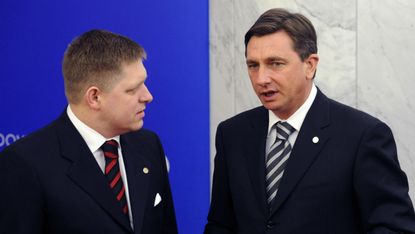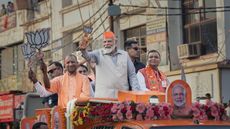Central Europe rocked by double resignation
Departure of Europhile Slovak and Slovenian leaders could spell trouble for the EU

The resignation of Slovakia’s prime minister just one day after his Slovenian counterpart stood down looks set to destabilise central Europe and could shift the balance of power against the EU.
Slovak Prime Minister, Robert Fico, is to resign amid a scandal over the murder of journalist Jan Kuciak, who was investigating government corruption and links to the Italian mafia when he was killed. His fiancee was also murdered during the attack on their home last month.
The BBC says the killings have gripped Slovakia, “leading to calls for an investigation and anti-government protests in Bratislava on Friday which were thought to be the largest in the country since the fall of communism in 1989”.
Subscribe to The Week
Escape your echo chamber. Get the facts behind the news, plus analysis from multiple perspectives.

Sign up for The Week's Free Newsletters
From our morning news briefing to a weekly Good News Newsletter, get the best of The Week delivered directly to your inbox.
From our morning news briefing to a weekly Good News Newsletter, get the best of The Week delivered directly to your inbox.
The growing scandal has already brought down interior minister Robert Kalinak, who resigned on Tuesday.
Earlier this month, Slovakia’s President Andrej Kiska called for a “radical reconstruction” of the government or fresh elections, after all seven suspects arrested in connection with the murders, including one man who had done business deals with officials close to Fico, were released without charge.
The EU has urged Slovakia swiftly to investigate the murders which “raised fresh concern about media freedom and corruption both in Slovakia and more widely in Europe”, says The Guardian.
The murders came after the assassination last October of the investigative journalist Daphne Caruana Galizia, who had denounced corruption in Malta.
“How far Fico’s exit as prime minister can calm public pressure is still to be seen,” says RTE. There are fears that the political fallout from the scandal could bring down the centre-left coalition and usher in a new more Eurosceptic government.
Fico, who has been in power for much of the past 12 years, has called Slovakia a “pro-European island” in central Europe and has sought to stand out from largely eurosceptic leaders in the region.
However, the timing of his resignation could not be worse for the EU.
On Wednesday, Slovenian Prime Minister, Miro Cerar, another Europhile liberal, announced that he was to step down after the country’s top court annulled last year’s referendum on a key government-backed railway project and ordered a new vote.
Cerar had faced the possibility of impeachment last year when he was accused of seeking to interfere with the judiciary after voicing support for a Syrian asylum seeker.
As in much of central Europe, immigration is the central political issue in Slovenia, and it is feared that, with Cerar gone, opposition rightwing Eurosceptics could make big gains in the elections in May.
Although unrelated, the loss of two of central Europe’s most pro-European leaders is an ominous sign for the EU, especially amid a rise in support across the continent for the far-right and a growing threat from Russia.
Create an account with the same email registered to your subscription to unlock access.
Sign up for Today's Best Articles in your inbox
A free daily email with the biggest news stories of the day – and the best features from TheWeek.com
-
 India elections start amid violence, hate speech accusations
India elections start amid violence, hate speech accusationsTalking Points Narendra Modi seeks a third term while critics worry about the future of the country's democracy
By Joel Mathis, The Week US Published
-
 'Biden is smart to keep the border-security pressure on'
'Biden is smart to keep the border-security pressure on'Instant Opinion Opinion, comment and editorials of the day
By Harold Maass, The Week US Published
-
 Bird flu worries mount as virus found in milk, cows
Bird flu worries mount as virus found in milk, cowsSpeed Read The FDA found traces of the virus in pasteurized grocery store milk
By Peter Weber, The Week US Published
-
 Myanmar: the Spring Revolution and the downfall of the generals
Myanmar: the Spring Revolution and the downfall of the generalsTalking Point An armed protest movement has swept across the country since the elected government of Aung San Suu Kyi was overthrown in 2021
By The Week Staff Published
-
 Poland, Germany nab alleged anti-Ukraine spies
Poland, Germany nab alleged anti-Ukraine spiesSpeed Read A man was arrested over a supposed Russian plot to kill Ukrainian President Zelenskyy
By Peter Weber, The Week US Published
-
 Israel hits Iran with retaliatory airstrike
Israel hits Iran with retaliatory airstrikeSpeed Read The attack comes after Iran's drone and missile barrage last weekend
By Peter Weber, The Week US Published
-
 Is there a peaceful way forward for Israel and Iran?
Is there a peaceful way forward for Israel and Iran?Today's Big Question Tehran has initially sought to downplay the latest Israeli missile strike on its territory
By Sorcha Bradley, The Week UK Published
-
 Sudan on brink of collapse after a year of war
Sudan on brink of collapse after a year of warSpeed Read 18 million people face famine as the country continues its bloody downward spiral
By Peter Weber, The Week US Published
-
 How powerful is Iran?
How powerful is Iran?Today's big question Islamic republic is facing domestic dissent and 'economic peril' but has a vast military, dangerous allies and a nuclear threat
By Harriet Marsden, The Week UK Published
-
 US, Israel brace for Iran retaliatory strikes
US, Israel brace for Iran retaliatory strikesSpeed Read An Iranian attack on Israel is believed to be imminent
By Peter Weber, The Week US Published
-
 How green onions could swing South Korea's election
How green onions could swing South Korea's electionThe Explainer Country's president has fallen foul of the oldest trick in the campaign book, not knowing the price of groceries
By Sorcha Bradley, The Week UK Published